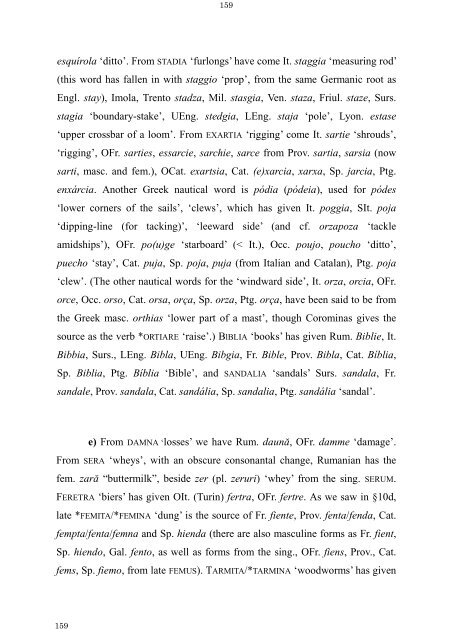The Latin Neuter Plurals in Romance - Page ON
The Latin Neuter Plurals in Romance - Page ON
The Latin Neuter Plurals in Romance - Page ON
Create successful ePaper yourself
Turn your PDF publications into a flip-book with our unique Google optimized e-Paper software.
159<br />
159<br />
esquírola ‘ditto’. From STADIA ‘furlongs’ have come It. staggia ‘measur<strong>in</strong>g rod’<br />
(this word has fallen <strong>in</strong> with staggio ‘prop’, from the same Germanic root as<br />
Engl. stay), Imola, Trento stadza, Mil. stasgia, Ven. staza, Friul. staze, Surs.<br />
stagia ‘boundary-stake’, UEng. stedgia, LEng. staja ‘pole’, Lyon. estase<br />
‘upper crossbar of a loom’. From EXARTIA ‘rigg<strong>in</strong>g’ come It. sartie ‘shrouds’,<br />
‘rigg<strong>in</strong>g’, OFr. sarties, essarcie, sarchie, sarce from Prov. sartia, sarsia (now<br />
sarti, masc. and fem.), OCat. exartsia, Cat. (e)xarcia, xarxa, Sp. jarcia, Ptg.<br />
enxárcia. Another Greek nautical word is pódia (pódeia), used for pódes<br />
‘lower corners of the sails’, ‘clews’, which has given It. poggia, SIt. poja<br />
‘dipp<strong>in</strong>g-l<strong>in</strong>e (for tack<strong>in</strong>g)’, ‘leeward side’ (and cf. orzapoza ‘tackle<br />
amidships’), OFr. po(u)ge ‘starboard’ (< It.), Occ. poujo, poucho ‘ditto’,<br />
puecho ‘stay’, Cat. puja, Sp. poja, puja (from Italian and Catalan), Ptg. poja<br />
‘clew’. (<strong>The</strong> other nautical words for the ‘w<strong>in</strong>dward side’, It. orza, orcia, OFr.<br />
orce, Occ. orso, Cat. orsa, orça, Sp. orza, Ptg. orça, have been said to be from<br />
the Greek masc. orthias ‘lower part of a mast’, though Corom<strong>in</strong>as gives the<br />
source as the verb *ORTIARE ‘raise’.) BlBLIA ‘books’ has given Rum. Biblie, It.<br />
Bibbia, Surs., LEng. Bibla, UEng. Bibgia, Fr. Bible, Prov. Bibla, Cat. Bíblia,<br />
Sp. Biblia, Ptg. Bíblia ‘Bible’, and SANDALIA ‘sandals’ Surs. sandala, Fr.<br />
sandale, Prov. sandala, Cat. sandália, Sp. sandalia, Ptg. sandália ‘sandal’.<br />
e) From DAMNA ‘losses’ we have Rum. daună, OFr. damme ‘damage’.<br />
From SERA ‘wheys’, with an obscure consonantal change, Rumanian has the<br />
fem. zară “buttermilk”, beside zer (pl. zeruri) ‘whey’ from the s<strong>in</strong>g. SERUM.<br />
FERETRA ‘biers’ has given OIt. (Tur<strong>in</strong>) fertra, OFr. fertre. As we saw <strong>in</strong> §10d,<br />
late *FEMITA/*FEMINA ‘dung’ is the source of Fr. fiente, Prov. fenta/fenda, Cat.<br />
fempta/fenta/femna and Sp. hienda (there are also mascul<strong>in</strong>e forms as Fr. fient,<br />
Sp. hiendo, Gal. fento, as well as forms from the s<strong>in</strong>g., OFr. fiens, Prov., Cat.<br />
fems, Sp. fiemo, from late FEMUS). TARMITA/*TARMINA ‘woodworms’ has given









